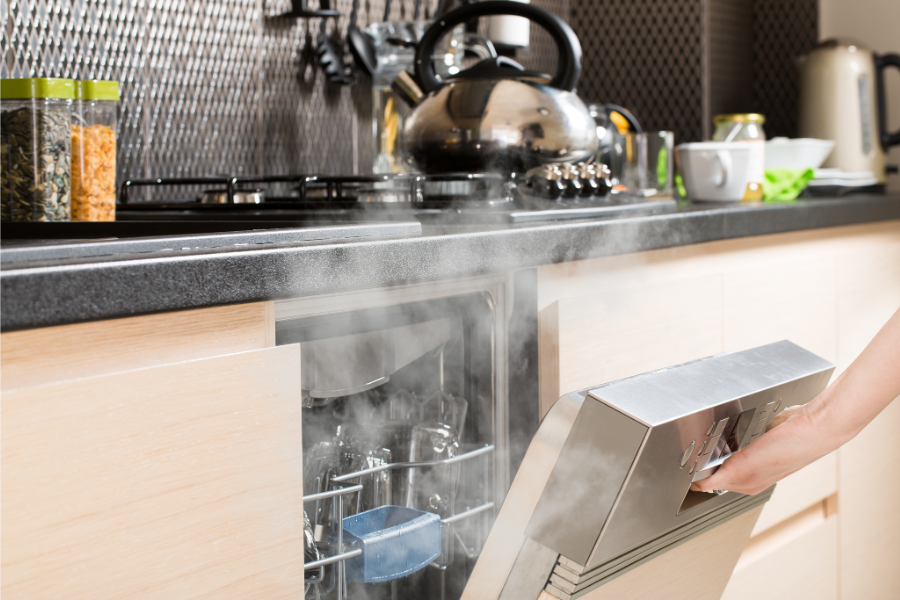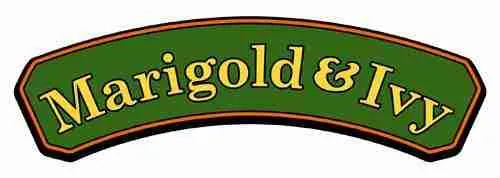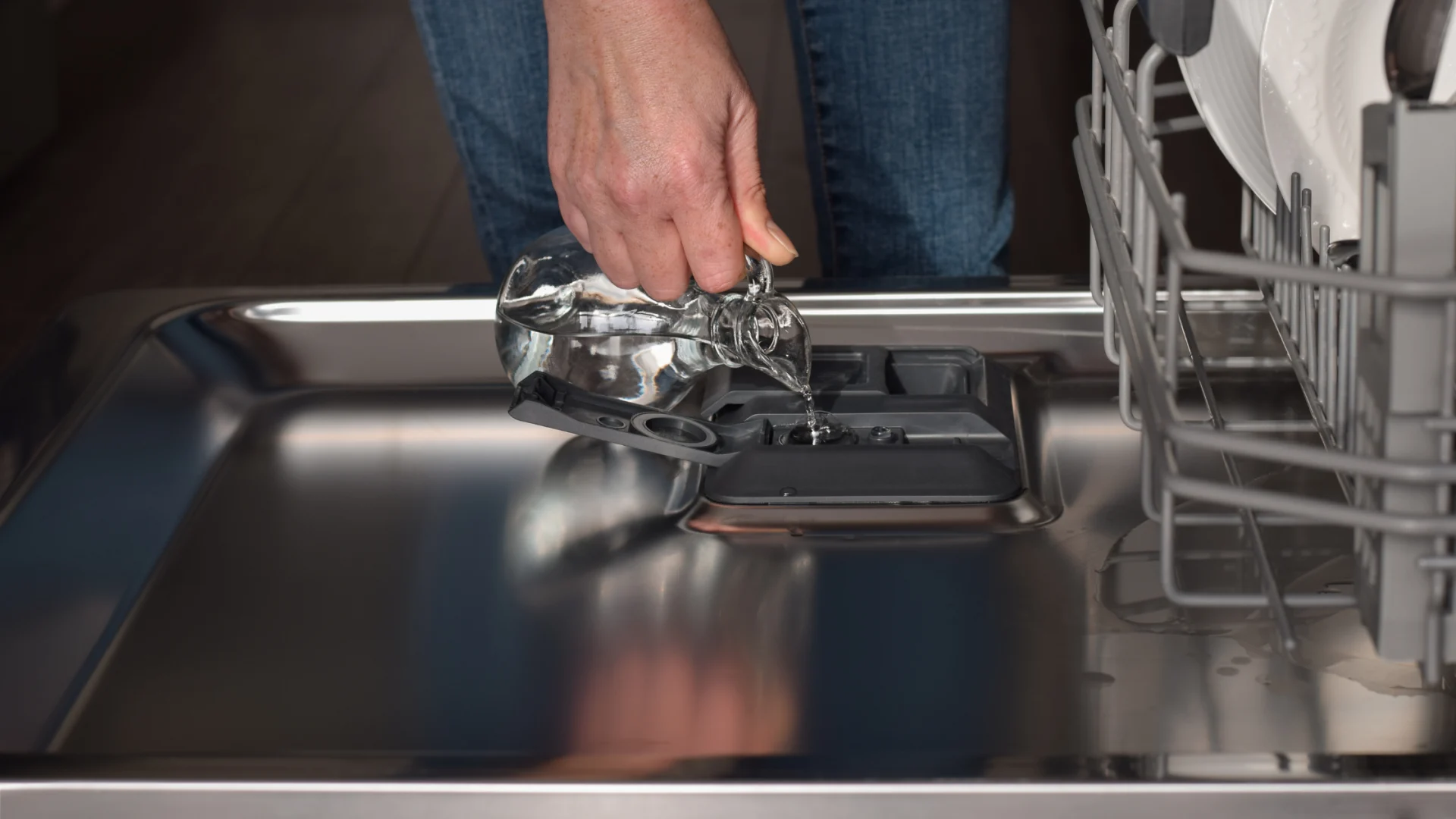Do you ever wash your dishes in the dishwasher and find them really cloudy? If yes, then your dishwasher needs some thorough cleaning. Dishwashers need occasional cleaning because soap scum, grease, and food debris can build. But how can you do so? Will cleaning a dishwasher with vinegar work?
Absolutely! Vinegar is a fantastic product for cleaning a dishwasher. This solution has acidic properties that can eliminate grease and grime. However, you must be careful when using this cleaning tool because its acidity may damage some specific parts of your dishwasher.
So, before you soak the dishes in vinegar, let’s find out if you can use the solution safely to clean your dishwasher.
Is It Safe to Clean the Dishwasher with Vinegar?
Vinegar is an excellent cleaner; it is safe in the dishwasher if you know how to use it correctly. Vinegar can remove dirt and bacteria and deodorize. But no matter how versatile it is, the solution contains high acetic properties.
The acidity of vinegar can damage the rubber gaskets and metal parts inside the dishwasher. If vinegar encounters these dishwashing parts, they may break down over time. Hence, when cleaning the dishwasher with vinegar, don’t allow the solution to touch the sensitive parts of the dishwasher.
What is the Best Vinegar to Clean a Dishwasher?
There are a lot of types of vinegar. But despite the different kinds, there is only one vinegar ideal for cleaning a dishwasher, and that’s none other than distilled white vinegar. This type of vinegar does not contain tannins, which can discolor the surfaces of the dishwasher.
Distilled white vinegar only has around 5% acetic acid and 95% water, making it a perfect monthly dishwasher cleaner and jewelry cleaner.
Read our article – Does White Vinegar Clean Jewelry? How to Revive Your Jewelry’s Radiance to learn how to clean your jewelry using white vinegar.
How Often Should I Clean My Dishwasher with Vinegar?
Ideally, it would be best if you cleaned your dishwasher at least once a month to keep it working well. Have a reminder on your calendar to schedule your cleaning time. If you choose to do it this way you can also do a deep thorough cleaning of the dishwasher once or twice a year in addition to the monthly cleaning.
Can I Use Vinegar Instead of Dishwasher Detergent?
Some people use dishwasher detergent only to clean their dishwasher. Actually, for cleaning the inside of the dishwasher, it’s better to use vinegar instead of detergent to clean it.
Vinegar is all-natural, efficient, and safe to use in your dishwasher. Like detergent, vinegar can deep clean the dishwasher interior and, most of all, remove stains, mildew, and mold.
However, do not mix vinegar and detergent nor put vinegar in the detergent cups. The acid levels of vinegar may cause damage to the dishwasher.
How Do I Clean My Dishwasher with Vinegar?

It’s time for the dishwasher to go full spa mode with vinegar. Follow these simple steps to clean the appliance safely.
Things You’ll Need:
- Vinegar
- Hot water
- Dishwasher-safe mug
- Clean cloth (optional)
Instructions:
- Pour one cup of vinegar into a dishwasher-safe mug.
- Place the mug on the upright top rack of the dishwasher and close the appliance.
- Run the dishwasher with hot water on a regular cycle for sterilization. The vinegar will then do its magic – loosens food particles, soap scum, and grease from the dishwasher’s racks and walls.
- Once the whole cycle is complete, open the dishwasher and remove the mug. Check the bottom of the rack for any traces of large particles that may have settled in the filter. You can remove them by hand or soapy cloth.
- Repeat the vinegar cleaning process monthly to keep the dishwasher clean.
How to Get Rid of Smells In the Dishwasher With Vinegar
The leading cause of a stinky dishwasher is the dirty filter. If you haven’t cleaned the filter of your dishwasher in a while, then it can become polluted over time. It’s time to remove the filter from the dishwasher and give it a good scrub with vinegar.
To achieve an overall pleasant odor in your dishwasher, follow the abovementioned method, but add baking soda to the ingredients. Vinegar is a deodorizer, and baking soda will help neutralize the smell. Once the cycle completes, open the dishwasher door after each time the cycle runs to dry the interior.
Did you know you can wash dishes with baking soda? Read our post – Can Baking Soda Clean Dishes? to learn how.
Can Vinegar Damage the Rubber Seals in Your Dishwasher?
Unfortunately, vinegar can damage the dishwasher’s rubber seals and even hoses. Because of this, it is not ideal to use vinegar to clean the dishwasher weekly. If you use vinegar often, the solution can harm some sensitive parts of the dishwasher, like certain types of hoses, and damage the seals of the dishwasher over time.
Vinegar is, however, safe to use in certain dishwashers. It is safe on dishwashers with natural rubber seals and any parts of the appliance made from silicone, fluorocarbon, polypropylene, and synthetic rubber seals.
Extra Tips For Cleaning the Dishwasher with Vinegar

A dishwasher is a sensitive appliance, and vinegar is an acidic solution that may cause irreparable damage when used frequently and improperly. Here are some tips to clean the dishwasher with vinegar.
Scrape Food Chunks First
Make it a habit of scraping food chunks from plates before loading them in the dishwasher. You can leave a few food particles because the detergent uses them to activate its cleaning agent. Stuff like skin, bones, peels, fibrous materials, and fat should be discarded from plates or bowls.
Clean the Dishwasher with a Soapy Rag
If you want a squeaky clean dishwasher, clean the interior and walls with a soapy rag. Wipe down the appliance’s interior, door, lip, and gasket. Then, run a normal cycle with vinegar to eliminate mold or mildew inside the dishwasher.
Allow the Dishwasher to Air Dry After Cleaning with Vinegar
Since the seal of the dishwasher is strong, the residual water may get trapped inside the appliance. Thus, when finished with the vinegar cleaning cycle, open the dishwasher door and air dry it completely.
Don’t Use Bleach
We strongly discourage the use of bleach to clean the dishwasher. No matter how foul the odor of the dishwasher is, don’t use bleach to remove it. Bleach is highly corrosive and will damage the dishwasher’s stainless steel and rubber bits.
Conclusion
Dishwashers are the ultimate water and timesaver in the kitchen. So, it’s essential to know how to maintain it to prolong its life. After reading this article, you now have the answer to the question, “Will Cleaning a Dishwasher with Vinegar Work?” or “Can I Clean My Dishwasher with Vinegar and Baking Soda?”
To reiterate, vinegar is efficient in cleaning the dishwasher. However, it is also important to note that highly acidic kinds of vinegar are excellent cleaners but not recommended for frequent use on dishwashers. They are too harsh and may damage the appliance.
Clean your dishwasher with vinegar at least monthly to keep it clean and smelling fresh. And for dishwashers that contain foul odors, add baking soda to help deodorize it. To make sure you are cleaning and taking care of your dishwasher properly, follow our tips above.
You can also use apple cider vinegar to clean your dishwasher; check out our article – Can I Use Apple Cider Vinegar to Clean My Dishwasher? to learn how.
Our question for you: Have you ever cleaned the inside of your dishwasher?

